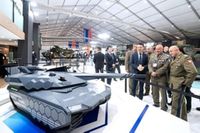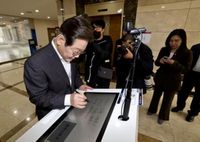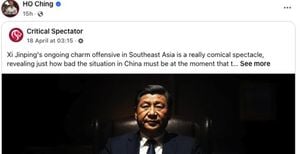On Thursday, April 17, 2025, Rep. Lee Jae-myung, a prominent candidate in the Democratic Party of Korea's presidential primary, made a significant pledge to bolster South Korea's defense exports. Speaking at the headquarters of the Agency for Defense Development in Daejeon, Lee outlined his ambitious plan to elevate South Korea's standing in the global arms market, aiming to position the nation among the world's top four arms exporters.
Lee's proposal includes convening regular meetings focused on export strategies and establishing a centralized "control tower" to oversee national efforts. This initiative highlights his commitment to enhancing government support for the burgeoning defense sector, which has seen remarkable growth in recent years. He emphasized the necessity of increased state funding for defense-related research and development (R&D) and proposed a revamp of policy loans to better assist exporters.
In a post on his Facebook page, Lee stated, "Expanding state investment in R&D is not an option but a necessity," underscoring the urgency of his plans. He also called for stronger global partnerships, encouraging Korean defense firms to collaborate with counterparts in regions such as Europe, Southeast Asia, Latin America, the United States, and India.
The backdrop to Lee's ambitious plans is the impressive surge in South Korea's defense exports, which reached $9.5 billion in 2024. Currently, South Korea holds a 2 percent share of the global arms market, a figure that pales in comparison to China's 5.9 percent and Germany's 5.6 percent, according to global arms trade data.
Meanwhile, the country's leading defense firms—Hanwha Aerospace, Hyundai Rotem, LIG Nex1, and Korea Aerospace Industries (KAI)—are already making significant strides in the international market. In 2024, Korea's defense exports surpassed $4 billion for the first time, a remarkable tenfold increase from 2015. Poland emerged as the largest importer of Korean defense systems, purchasing weapons worth approximately $2.51 billion, more than four times its 2023 purchases.
Among the most notable exports were 212 units of Hanwha Aerospace's K9 self-propelled howitzers and 134 units of Hyundai Rotem's K2 battle tanks. The Middle East has also shown increasing interest, with Saudi Arabia, the United Arab Emirates, and Turkey ranking among the top five importers of Korean-made weapons.
As geopolitical tensions continue to escalate, particularly in the wake of the Russia-Ukraine war, Korean defense firms have been capitalizing on new business opportunities, securing large-scale orders that have led to backlogs exceeding 80 trillion won (approximately $5.64 billion) across the major players in the industry.
Looking ahead, Hanwha Aerospace is reportedly close to finalizing a deal with Vietnam for the export of K9 self-propelled howitzers, anticipated to be worth around 1 trillion won. Hyundai Rotem is also nearing the completion of a second agreement with Poland for K2 battle tanks, which could be valued at over 7 trillion won. Additionally, LIG Nex1 is in discussions with Malaysia regarding the export of its Cheongung surface-to-air missile system, while KAI is exploring opportunities to sell its KF-21 fighter jet to the Middle East.
In light of these developments, investment analysts are optimistic about the future of South Korea's defense industry. A recent report from J.P. Morgan highlighted the growth potential of the four major defense companies, raising their stock price targets by an average of 28 percent. The report noted that there is "plenty of room to go" for their values to rise, indicating strong investor confidence in the sector.
J.P. Morgan's adjusted target stock prices for Hanwha Aerospace, Hyundai Rotem, LIG Nex1, and KAI are set at 950,000 won, 90,000 won, 370,000 won, and 120,000 won, respectively. However, as of Thursday afternoon, none of the stocks had reached these projections, prompting some speculation among investors.
Lee Tae-hwan, an analyst at Daishin Securities, remarked, "Korean-made weapons remain one of the top choices for Eastern European countries facing national security issues. Discussions about ordering conventional weapons will gain momentum. The K9 self-propelled howitzers and K2 tanks are excellent candidates with strong potential for scoring additional export deals in Eastern Europe." This sentiment reflects the growing confidence in South Korea's defense capabilities and the strategic importance of its exports in a rapidly changing global landscape.
As Lee Jae-myung continues his campaign, his proposals for enhancing defense exports resonate with a broader national strategy to strengthen South Korea's position in the global arms market. With a commitment to innovation and international collaboration, the future of South Korea's defense industry looks promising, potentially reshaping the dynamics of global military exports.





